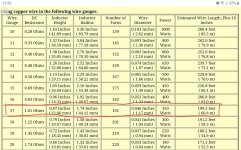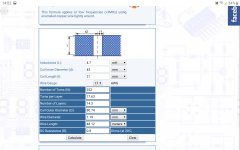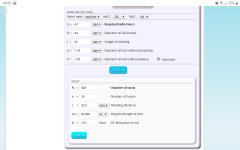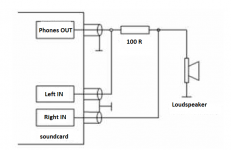Hello there
I need to replace the coil with a ferrite core with air core, due the distortion in high volumes.
The value of inductor is 4.7mH. Because of the high price I decided to try winding my own coil. I have checked fewer online calculators, but all they give a completely different results.
Here are three attached screenshots
the first one is taken from Shevano website
the second one from Tesla institute
the third one from Coil32
I kept the same former size and induction in the all of the simulators.
I don't have LCR meter and I'm unable to check the wonded coils.
Would you recommend some good and reliable calculator, which is closest to the measured results? I think 5% deviation is OK in my case.
Thank you in advance
Regards
Georgi
I need to replace the coil with a ferrite core with air core, due the distortion in high volumes.
The value of inductor is 4.7mH. Because of the high price I decided to try winding my own coil. I have checked fewer online calculators, but all they give a completely different results.
Here are three attached screenshots
the first one is taken from Shevano website
the second one from Tesla institute
the third one from Coil32
I kept the same former size and induction in the all of the simulators.
I don't have LCR meter and I'm unable to check the wonded coils.
Would you recommend some good and reliable calculator, which is closest to the measured results? I think 5% deviation is OK in my case.
Thank you in advance
Regards
Georgi
Attachments
You need to use consistent values: diameter vs radius, 17 vs 20 awg, just to name two things that popped at my eyes.
Besides that, you really need an LCR meter, even a cheap one can be OK if checked against valid items. IIRC mine did cost less than 15€ shipment included and is very reliable.
Ralf
Are you sure you are hearing distortion coming from a saturated core? What is the power going trough the coil?
Besides that, you really need an LCR meter, even a cheap one can be OK if checked against valid items. IIRC mine did cost less than 15€ shipment included and is very reliable.
Ralf
Are you sure you are hearing distortion coming from a saturated core? What is the power going trough the coil?
Why you want to wind it for yourself? If your goal is lowest distortion, then buy a baked air core coil with the proper value and that's it. Baking the coil makes the whole element to become one block and the windings are much more stable physically than non-baked coils, and so they do not squeak and resonate with each other, reducing harmonic distortion too.
The one from IN3OTD on the QSL website, seems to get great answers.
Inductance Calculation
The Ee DE-5000 High Accuracy Handheld Lcr Meter with TL-21 TL-22 New [1G3] | eBay
YouTube
Inductance Calculation
The Ee DE-5000 High Accuracy Handheld Lcr Meter with TL-21 TL-22 New [1G3] | eBay
YouTube
You need to use consistent values: diameter vs radius, 17 vs 20 awg, just to name two things that popped at my eyes.
Besides that, you really need an LCR meter, even a cheap one can be OK if checked against valid items. IIRC mine did cost less than 15€ shipment included and is very reliable.
Ralf
Are you sure you are hearing distortion coming from a saturated core? What is the power going trough the coil?
Thank you, Ralf
I've used only gauge 17 (1.18mm) in all of the simulations and I didn't mix diameter with radius, I guess.
The old inductor is Monacor LSIF 470/1 and it looks pretty small for a current, which exceeds sometime 14A. I have tested the woofer w/o crossover (second order LPF L4.7 C37 R7.8)into the same enclosure and distortion disappear even when I push it to the limit.
Also, if I had LCR meter I wouldn't ask you for a recommendation. Would you share with me where did you buy your LCR meter?
Arta labs has got a powerful limp module to execute impedance, rlc measurements. Would be a shame not to take advantage of it.
Why you want to wind it for yourself? If your goal is lowest distortion, then buy a baked air core coil with the proper value and that's it. Baking the coil makes the whole element to become one block and the windings are much more stable physically than non-baked coils, and so they do not squeak and resonate with each other, reducing harmonic distortion too.
Thank you, YSDR
Winding my own coil would half the cost.
Just one example - the cost of 17 gauge elamened wire is about £16/kg, which is £10 per each coil. I didn't find anything 4.7mH 18AWG for less than £20.
Also if you never try you'll never know.
Arta labs has got a powerful limp module to execute impedance, rlc measurements. Would be a shame not to take advantage of it.
Thank you Lojzek
I have never used ARTA, as I thought it's for acoustic measurement only, but I'll try it. I can measure some TS parameters only with digital multimeter, but I don't have proper microphone for acoustic measurements.
Weekend DIYer only.😛
Last edited:
The Visaton coils seems a bit underrated for the task. Get a proper cored coil for high current with a bigger wire and you’re fine (1-1.2mm wire). See here for an example of what I mean (different inductance): Jantzen audio fungo BOBINA nucleari 3,90mh - 1,2mm - 0,25ohm non-ferritspule | eBay
Keep in mind that for 4.7mH, an air core coil with 1mm wire has roughly double the resistance that your current coil, if you want to keep the same DCR you need at least 1.4mm or better 1.6mm wire. IMHO for this inductance a cored coil should be the best choice. And winding your own coils is not so easy without a winding machine, and if not properly baked they can also rattle.
I got my LCR meter from ebay, for roughly 15€ it measures LCR and tests transistors, and IMHO is more practical than a jig that needs to be connected to a PC.
Ralf
PS: are you really speaking about 1kW of power into your speakers?
Keep in mind that for 4.7mH, an air core coil with 1mm wire has roughly double the resistance that your current coil, if you want to keep the same DCR you need at least 1.4mm or better 1.6mm wire. IMHO for this inductance a cored coil should be the best choice. And winding your own coils is not so easy without a winding machine, and if not properly baked they can also rattle.
I got my LCR meter from ebay, for roughly 15€ it measures LCR and tests transistors, and IMHO is more practical than a jig that needs to be connected to a PC.
Ralf
PS: are you really speaking about 1kW of power into your speakers?
Hello there
I need to replace the coil with a ferrite core with air core, due the distortion in high volumes.
The value of inductor is 4.7mH. Because of the high price I decided to try winding my own coil. I have checked fewer online calculators, but all they give a completely different results.
Here are three attached screenshots
the first one is taken from Shevano website
the second one from Tesla institute
the third one from Coil32
I kept the same former size and induction in the all of the simulators.
I don't have LCR meter and I'm unable to check the wonded coils.
Would you recommend some good and reliable calculator, which is closest to the measured results? I think 5% deviation is OK in my case.
Thank you in advance
Regards
Georgi
Why do you assume the coil is the problem?
Please supply sufficient data for a meaningful answer. Like what drivers and crossover or speaker you are using. I have rarely heard a speaker that doesn't distort at high volume.
Personally, I don't mess around. I have an expensive £70 multimeter that can measure inductance, capacitance, resistance an' all that.
Evidently, ferrite cores are worse than air-coils. But a bad-sounding speaker might have other reasons for sounding bad. Advice depends on circumstances.
This one is very accurate. I'm winding my coils for quite some time because prices of finished coils in most cases are insane. One kilogram of copper wire costs about 10€. You can find plastic formers on aliexpress. Enter the parameters in CoilMaestro and it will give you few ways to check if you are on the right track (Rdc, weight, dimensions). You do need a little practise in making nice coil (windings and layers without gaps). I apply acrylic lacquer with brush after every layer and dip the coil in it when finished to avoid microphonic effect. The better data you feed the simulator, more precise the result will be.
Coil Maestro - freeware coil/solenoid calculator
Coil Maestro - freeware coil/solenoid calculator
Last edited:
The Visaton coils seems a bit underrated for the task. Get a proper cored coil for high current with a bigger wire and you’re fine (1-1.2mm wire). See here for an example of what I mean (different inductance): Jantzen audio fungo BOBINA nucleari 3,90mh - 1,2mm - 0,25ohm non-ferritspule | eBay
Keep in mind that for 4.7mH, an air core coil with 1mm wire has roughly double the resistance that your current coil, if you want to keep the same DCR you need at least 1.4mm or better 1.6mm wire. IMHO for this inductance a cored coil should be the best choice. And winding your own coils is not so easy without a winding machine, and if not properly baked they can also rattle.
I got my LCR meter from ebay, for roughly 15€ it measures LCR and tests transistors, and IMHO is more practical than a jig that needs to be connected to a PC.
Ralf
PS: are you really speaking about 1kW of power into your speakers?
Thank you Ralf
I have ordered the wire yesterday and I wish to try. The winding machine is not a problem at all. It will takes 1 hour to build it. I just need to know which calculator is most reliable.
1kW?? Of course I'm not forcing the speakers that much. 14A picks, but 4A continuous current (20V/ch amp output).
1 ohm DCR is not too bad. I'll attenuate mids and highs a bit.
4.7mH; 1.18mm; former diameter 30mm; number of turns 364; number of layers 18; coil length 23.86mm; wire length 58.6m; dcr 0.924
Why do you assume the coil is the problem?
Please supply sufficient data for a meaningful answer. Like what drivers and crossover or speaker you are using. I have rarely heard a speaker that doesn't distort at high volume
Thank you System7
I have tested the woofer fitted to the box with and without the crossover. Of course overpowering the woofer ileads to distortion, but this kind of distortion sound like a ringing cone. When I connect the woofer without XO the ringing sound disappear even on highest volume.
The driver is SPH-6M in 6.8l ported enclosure dual 3.5cm ports, 35cm long, tuned to 46Hz,
1 inch dacron on the back wall. Crossover 480Hz LPF second order.
4.7mH; 1.18mm; former diameter 30mm; number of turns 364; number of layers 18; coil length 23.86mm; wire length 58.6m; dcr 0.924
Thank you very much Lojzek!
That is very close to Coil32 result.
Greetings
Georgi
Last edited:
This one is very accurate. I'm winding my coils for quite some time because prices of finished coils in most cases are insane. One kilogram of copper wire costs about 10€. You can find plastic formers on aliexpress. Enter the parameters in CoilMaestro and it will give you few ways to check if you are on the right track (Rdc, weight, dimensions). You do need a little practise in making nice coil (windings and layers without gaps). I apply acrylic lacquer with brush after every layer and dip the coil in it when finished to avoid microphonic effect. The better data you feed the simulator, more precise the result will be.
Coil Maestro - freeware coil/solenoid calculator
Thank you very much Zvu
Great tool! I'll try it as soon as possible, probably tonight.
Greetings
Georgi
I used to roll my own but found I could buy inductors almost as cheap. Remember, copper is sold by the pound or ton, so that's a great equalizer. Also you need some sort of winding mechanism with a turns counter. You'll need spools of some kind for the air cores. Finally an LCR meter for measurements.
If you're dead set on winding your own, good luck and have fun. Generally speaking I found the process was more trouble than it was worth.
If you're dead set on winding your own, good luck and have fun. Generally speaking I found the process was more trouble than it was worth.
I used to roll my own but found I could buy inductors almost as cheap....
Do share please.
- Home
- Loudspeakers
- Multi-Way
- Which is the most reliable air coil calculator?



